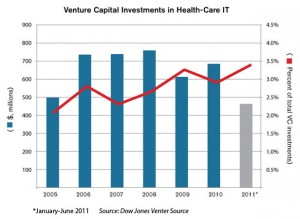 Investment trends, design challenges, top apps, and tablets for clinicians are often discussed in mobile health circles. This month Technology Review has put together a series on e-medicine, which included a focus on mobile health this week. Here's a quick round-up of their coverage so far:
Investment trends, design challenges, top apps, and tablets for clinicians are often discussed in mobile health circles. This month Technology Review has put together a series on e-medicine, which included a focus on mobile health this week. Here's a quick round-up of their coverage so far:
First up is TR's trend piece on investment challenges facing healthcare startups. "The usual reason HIT doesn't get funded is because the opportunities aren't large enough," Barbara Lubash, a managing director at Versant Ventures, told TR. Large hospitals are hesitant to adopt new technology after spending hundreds of millions of dollars on legacy IT systems developed by large companies such as Siemens, Epic, and Cerner. This hesitation forces entrepreneurs to focus on niches in HIT, including mobile apps, which many investors don't believe are sufficiently large.
Despite these hurdles, Dow Jones VentureSource estimates that VC investments in HIT rose about 20 percent in 2010, to $460 million (about a fifth of the $2.3 billion that venture capitalists invested in all health companies), according to the report. Jessica Canning, research director for VentureSource, told TR that half the deals counted in 2010 were seed-stage or first-round financings. Canning said that the numbers are "very promising at a time when VCs are struggling to keep their existing portfolios alive. It means a pipeline is being built in HIT."
TR also has a profile piece on Massive Health's Aza Raskin, a well-known Silicon Valley-based designer, whose company is currently developing consumer-facing apps for chronic conditions. Massive Health has yet to discuss its specific plans or strategy.
"Health really happens in between doctor's visits," Raskin told TR in an interview. "We now have these always-on connections, rich interfaces, mobile devices, and people who are willing to share," he said.
Raskin believes that health technology is the next large user-design challenge. "What needs the most help? It's not social photo sharing, it's health," he told TR. "The U.S. has a growing problem with chronic health conditions, and the costs of managing them are going up. We need new tools to address that."
Technology Review also created must-watch short video piece on Boston's Beth Israel Deaconess Dr. Henry Feldman, who is the Chief Information Architect for the Division of Clinical Informatics. On the iPad, Feldman says that "It's not... for everyone, but for what I do as a hospitalist, it's absolutely critical." Since Feldman's day doesn't include sitting at a desk, using the tablet is a huge improvement over COWs (computer on wheels), which along with fixed monitors in wards are what tablets are replacing, he said, not PCs.
When Feldman started using the iPad (he hinted that was in line the day it came out), the hospital already had made a digital health records system in place. "Now, the revolution is about quality. Not only 'are we doing the right thing, but are we doing it the right way?' What devices like this do is bring quality tools to the bedside," he said.
TR also put together their list of the most promising mobile apps, which includes a number of apps MobiHealthNews has covered in the past, including: Instant Heart Rate, Mobile MIM, HealthVault, iStethoscope, Telcare, and an app for an upcoming connected device called Lark, a competitor to Zeo in the sleep monitoring space. Interesting that almost all of the apps require a peripheral device component -- Instant Heart Rate is the exception.
For more, check out TR's coverage of HIT investments, clinicians using iPads, a short list of note worthy apps, and its profile of Aza Raskin.














